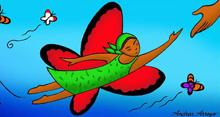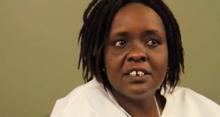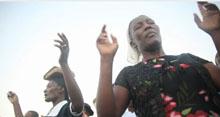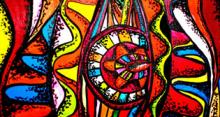Additional Stories
The Gift
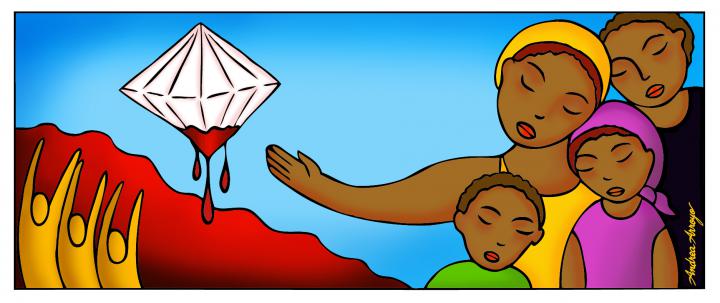
My name is Yei and I am the third daughter born from my father’s fifth wife. I was born in the district of Kono in 1960. My momma told me: “Yei, you will never be poor. Look at this rich land full of bananas, mangoes, bush yam, peanuts, cassava and rice. Take what you need and leave the rest. This is the peaceful law of the land.”
My momma taught me to worship the diamonds. They were gifts from the Supreme Being, Yaata. We blessed the land, offered kola nuts, spilled the blood of a chicken from a calabash and prayed. When the first rains battered down in April we looked furtively on the ground for diamonds. We kept them to protect us from bad luck falling upon our family.
We only ever exchanged them for medicine from the Groun Groun man and they performed rituals with them to ward off evil spirits. It was said if you ever sold a diamond, bad luck would follow your family, and you could end up dead in the jungle. Only the elders in the Secret Societies knew where the pulse of the land laid buried deep beneath the red-hot earth. They were the custodians of many secrets. However we all knew it had been prophesied that if the diamonds were found, great evil would be performed on our land. It was they who traded our secrets to the white man. Who else could it have been?
My momma was afraid of white men. She warned me and my sisters never to trust them. They were ghosts from the past who could only bring us trouble. I never knew I would actually live to see one. And when I did, I ran, hid and prayed. My prayers were too late. They moved into my town Yengema with a week’s notice, and set off sirens giving us locals half an hour to pack our bags and leave our homes. The white men came to Yengema and performed the work of the devil.
I had to vacate my wooden shack at eight in the morning with my seven children under the age of sixteen. They blasted the earth open. I was made homeless within an hour, my house and several others flattened by the explosion. Many of us walked three hours southeast along the dusty roads to Koidu. Some families fled into the bush.
I lost my husband and his two other wives in the mayhem. I lost my momma’s sacred teachings too. How could I teach my children that diamonds should stay deep in the earth. That diamonds are for healing only. How could I?
When we arrived in Koidu every piece of earth had been dug up for mining. Boys as young as eight had been stripped to their threadbare shorts, knee deep in sludge, manipulating their bodies under the red-hot sun, while holding a large sieve, shifting and shaking for diamonds. This town had accepted the kimberlite miners coming in and buying up all their land. The Paramount chiefs became richer, and the local people had become poorer.
My sons were meant to be farmers, storytellers, healers, and now they wanted to be miners. I didn’t know how to raise miners, but the white men took care of that. My two eldest found themselves a job with the mining company. They were employed to look through the dregs of the gravel for diamonds. One day they found something of worth. And they were promoted. Given a stone house for all of us to live in. I didn’t know how to watch them become corrupted by greed. I lost my right to mother them as soon as they began earning a wage. They took the place of their missing father. They were the new men of the house.
It was hard watching my sons come home in a big car filled with food for all the family. But I had five more children who still needed feeding. I knew that the Supreme Being would throw its might. The wrath of the Yaata would soon come to this chiefdom. My momma had told me that Yaata gave us gifts from the heavens every rainy season because we had been good to the land, respecting the minerals, species and the plants. She taught me that we were guardians of the earth, the trees and animals. And we must regularly offer kola nut, palm wine and blood of a freshly killed animal at the base of the roots in the jungle.
She prepared me for losing children in childbirth, even warned me that at least one or two of my children may die before the age of one. This was to be expected and nothing for me to worry about. She advised me to have plenty so that when a child died, I’d be too busy with the rest of my children to cry over the loss. I wasn’t to worry because my children would bear me gifts of grandchildren and this would keep me busy for the rest of my life.
When my momma died of dengue fever, my father forced me to marry at the age of fourteen. I knew I shouldn’t grieve, as my momma had given me the gift of her living long enough to see me into puberty. She was happy that none of her children who survived past the age of one died before her. On her death bed she told all her children that marriage was a formality that all of us must do. And as for the grandchildren she would never see, she was okay, as she didn’t have to witness the death of any of them.
I was the third wife of a man aged thirty-five. I was expected to do all the cleaning and cooking. I gave birth to seven children and all of them had lived beyond the age of two. I was lucky and began dreaming of what other good fortune would bestow me. My momma warned me that girls shouldn’t have big dreams. I was born to rear my children, stay at home, not speak out of turn and keep behind my husband. But how could I when war came to my country?
First I lost my two eldest sons. My prayers to Yaata were half-answered. They put down the diamonds, and then picked up guns. I didn’t even recognize them anymore. They tried to reason with me. They had a point. We had no electricity, the roads were rough, more babies seemed to be dying at birth like never before and we were not getting richer. Our land had been sold, and we were told that diamonds were going to make our country rich.
My two sons were angry. They didn’t want to work for the white man anymore. They didn’t want anything to do with the government, because it was stealing our money and investing it in America and Lebanon for their own means. It was true, I wasn’t meant to be poor. But there was no land left to farm our food, no money to buy our food. What was I to do?
Why did the white men need these diamonds to adorn their wives’ bodies? Why couldn’t they leave our land alone?
I never saw my two eldest sons again. They told me not to worry. They were going to sort this rotten country out. They were tired of erupting diamonds out of every mountain and hill, with no evidence of wealth in our district. The one big car that they shared was not enough, they wanted to be rich like their white bosses, our politicians and the government officials.
What do you do when your babies walk out of the house to pick up an AK-47 and fight with the rebels? They were still my babies even though they were young men of eihgteen and nineteen. I should have been planning their weddings. Finding two young beautiful girls for them to marry. Seeking two dowries to help my income. But war had seized my country like a contagious disease. Everyone was affected by it. Instead I worried if my sons were the monsters performing savage acts on the civilians.
Was it my sons, or the government who were burning villages down? Did my sons rape women, like my eldest daughter was raped in front of me and my grandchildren? Did they slice the ears and noses of innocent people like the rebels chopped my right hand off so I had no thumb to vote with?
My momma never prepared me for this! I was supposed to lose my babies in child birth or before the age of one. Once they passed the danger age of one, and the fragile age of five, I could relax. I was free of seeing my babies die before me. I had to hide my two youngest aged nine and ten in fear that they would be kidnapped and flogged into picking up a machine gun or a machete. I told my daughter, Don’t have babies, that way you will never have to see them die.
But it was too late. Sia had just given birth when this bloody war moved into my district in 1994. We woke up to the rebels singing: “Where are our diamonds, Mr President? Where is our gold, Mr President? The Revolutionary United Front is hungry to know where they are. RUF has come to save Sierra Leone.”
I was confused. I saw men dressed in government army clothes and men dressed as bandits with cloth tied above their knees. They began singing again: “Go tell the president Sierra Leone is my home. Go tell the parents you see me no more. I’m fighting forever. Every Sierra Leonean is fighting for their land.”
I learnt later on the radio they were the Sobel. Soldiers who had absconded from the government army and joined ranks with the rebels to fight against the corrupt government.
There was no time for thinking. I had to grab the remnants of my family, and walk towards the bloodied crowd. Keep on looking forward. I had to spur my daughter on who had been raped. I heard one scream. At that point her new born was taken from her. I tried to console her, and it was then I lost my right hand. Dragged from my screaming daughter and told: “Go tell Mr. President you have no thumb to vote with.” Then the rebel swung his brutal cutlass down below my elbow. My four youngest sons caught me before I passed out.
An old man came to my rescue as if he were prepared for my amputation. He tied a cloth tightly around it and applied a poultice. I looked up and winced at his scabbed, noseless face. There were many like us, feet, noses, ears and lips just tossed to the roadside. The red dust now red clots congealed along the muddy tracks.
I thanked the Supreme Being. I could still walk. My feet were my passport out of this war. I and what was left of my family walked for two months to Guinea. My two boys aged fourteen and fifteen pleaded with me to let them go and join the struggle. It wasn’t any easier. I had lost my two eldest to this war, but it was even more painful to let the next two flee their gnarled nest. I prayed they would find their two older brothers. At least Yaata would spare me this.
They left in the middle of the night. Only I and my children noticed. Everyone was grieving for somebody. Everyone had a relative who had been either killed, raped, were in the army or fighting with the Sobel. I was mourning the loss of my gift. My grandchild slaughtered, and only three children left. Nobody batted an eyelid when stories were told. It was to be expected that more than half of a family could be lost to this civil war.
Fifty or more of us walked in silence through the bush, eating berries, catching fish from the rivers and sleeping in the elephant grass at night. We were thirty-five by the time we reached the line-up to the Guinea border. Some had died, and others had run off to join the Sobel.
It took one week to reach the border. There were orphans, widows and me. There was no name for me. No name for a woman who loses all her children.
My daughter's rape didn’t bear the scars of amputation. How did they know at the border that she was not associated with the Sobel? Those of us who had been amputated wore the proof of the Sobel signature. It was our legal ID into the refugee camps. My daughter and many others who appeared to be physically intact were denied entry. Including my two youngest boys, aged nine and ten who were old enough to be spies for the Sobel.
My daughter pushed me over the border. She swooped her two brothers in her arms. “Trust me, Momma. We’ll wait for you. The war will soon be over. You told us that. Nothing lasts forever. By the time we walk back to our village it will be empty and we can start all over again.”
I couldn’t look back. How could I? If I couldn’t remember the last time I saw their faces, then maybe I would see them again. Maybe it was best for me to die. My momma appeared in front of me. She was waiting for me at the border as if she were expecting my arrival. She held me tight and said: “Your war is not done. It’s not your time to pass over. Yaata bless this child.”
I left the refugee camp in 2002 four months after the war ended. My momma was right: I had gifts to keep me busy. My daughter and two youngest sons were still alive. I had grandchildren to take care of while they continued to rebuild their town from the ashes.
Four beautiful girls aged four to seven, with Muslim names. Their parents had no time to teach them Yaata’s law, they were too busy piecing their fragmented lives together. Just before the first rains in April arrived, I packed my basket with kola nut, blood from a chicken, and yams, and placed it upon my head. I bound the two youngest, Fahima and Atia, to my torso. One nestled in front upon my breast, and the other snuggled upon my back.
Rizwana took hold of my good arm, and the eldest Nabu ran freely in front of me as we made the journey up a hill. Dark fell upon us, and so we bedded down at the foot of a tree. I built a small fire and cooked some yams for us to eat.
We huddled around the fire, with the two youngest sprawled on my lap. Rizwana and Nabu finally took hold of my mutilated arm. They stroked it and kissed it. “Momma,” Nabu said like a question. I knew she wanted to ask me my story. But I beckoned her to hush, and passed on my mother’s gift.
“My granddaughters, one day you will no longer be children. You will have to marry men, and one day you may give birth to your sons. But remember your place is in front of your men. No longer must you stand behind and let the men destroy our land. Look, Yaata is here in these mountains, in the hills, in the trees, in the animals. Yaata is mother nature, and you will be mothers too. Take care of your children. Teach them the laws of the land. Protect them from the curse of Yaata. Yes, death will come to all of us. It may even come to your children before you have passed. But if you live your life respecting the land, happiness will follow you like your shadow. Steal from the land and suffering will follow you like your shadow.”
All four of my granddaughters were asleep by the time I had handed down my gift. We woke to pouring rains, hailstones hitting us awake. The girls cheered and began looking at the earth scrutinizing every bit of rock, twig and stone. Nabu screamed: “Look, Momma, Yaata.”
She had found one of its minerals. She began digging into the earth with her hands. My eyes welled as at that moment I knew there was hope. My daughter and two sons, who had survived the war, had passed on their stories of the Supreme Being.
I poured the blood of the chicken from a calabash into the rugged hole. I let each of the girls throw two pieces of kola nut into the air. They scattered around the hole. I wailed, prostrated and sung prayers. In my final breath, I gasped: “Yaata bless these children.”
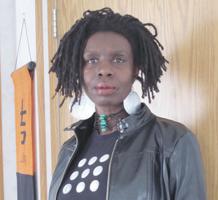
Dr. Valerie Mason-John has just completed her second novel (unpublished) I Am Memoried. The Gift is a short story that came out of her research that she conducted for the novel. Mason-John lived in Sierra Leone for several months in one of the Diamond Districts that was devastated by the recent Civil war. She had the privilege of interviewing ex Rebels, Amputees, people who escaped the refugee camps, civilians who lost all their families during the civil war and politicians. She also interviewed the traditional members of the Kona Tribes and learnt about the secret and sacred practices of their culture. I Am Memoried weaves the traditional and mythical life of African Society with the rebel war and with high society England to tell a modern day Family Saga. Her first novel Borrowed Body - renamed the Banana Kid, won the Mind Book of the Year award and was named the British Color Purple. She is also the author of several nonfiction books and including Broken Voices; ‘Ex Untouchable Women Speak Out’ about the Lives of the Dalit Women in India, and has had several plays produced. She is Sierra Leonian of Slave stock, born in the UK, now living in Canada. For information about her new, unpublished novel I am Memoried or for American Rights of Borrowed Body, Detox Your Heart, or any other literary inquiry please contact her agent, kenshermanassociates@gmail.com.
Illustration by Andrea Arroyo
Related Content
|
Beatrice Lamwaka's "Butterfly Dreams" is the story of a young woman who returns to her mother after five years of being a child soldier. |
Esther, once part of the Maasai tribe in Kenya, shares how one woman empowered her to become an activist and better mother. |
This visual poem celebrates the strength that many Haitian mothers have displayed in the wake of the devastating 2010 earthquake. |
Paula Obè's song/poem celebrates her mother and grandmother as well as our women ancestors who paved the path for women's equality.
|
